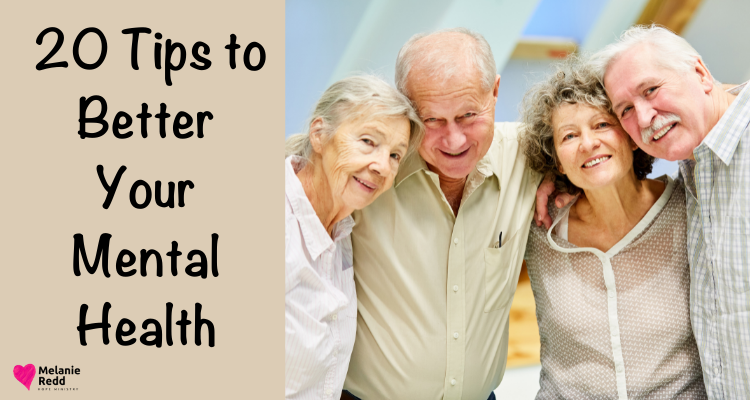20 Tips to Better Your Mental Health

Better Mental Health.
When it comes to their overall well-being, what a lot of people don’t realize is that having good mental health is just as important as optimal physical health.
Mental health, of course, includes your social, psychological, and emotional well-being.
How you think, feel, and act as you cope with life is affected by your mental health.
It also helps determine how you make choices, relate to others, and handle stress.
From childhood, adolescence, through adulthood, mental health is important at your life’s every stage.
20 Tips to Better Your Mental Health
Simply saying, all people need good mental health since it’s essential for people to live happy and healthy lives.
To help you out, here are 20 tips for bettering your mental health:
First… Stay Positive to Better Your Mental Health
Having a positive outlook is important when bettering your mental health. It’s one way to stay healthy and happy emotionally.
You can stay positive by doing the following:
Taking a break from all negative information.
You can read and watch the news but you should know when to stop. You can reach out for support using social media and feel connected to other people but be careful.
As much as possible, don’t negatively compare your life to others, get into arguments, and fall for rumors.
Finding the balance between your negative and positive emotions.
It’s normal to feel negative emotions, such as anger or sadness. It’s true no matter how you strive to stay positive. Moving through difficult situations requires that you feel them. They can help you respond to a problem but you mustn’t let those emotions take over.
For example, worrying too much about the future or constantly thinking about some bad things that happened months or years ago isn’t helpful.
Try clinging to your positive emotions as much as possible.
Second… Craft A Mental Health Plan
One of the first courses of action that you should take is mapping out steps that’ll lead you to better mental health.
Do note that it may be difficult to do this by yourself, so it’s a good idea to call a professional.
For instance, if you’re suffering from anxiety, a therapist from Alvarado Parkway Institute may help you identify the best ways to combat your specific condition.
Making a mental health plan can be initially overwhelming, but once you have the plan, taking the steps, and putting everything into practice becomes easier.
Third… Take Good Care Of Your Physical Health
Your mental health and physical health are connected, so if you want to take care of your mind, take good care of your body.
You can take care of your physical health by doing the following:
Keep yourself active.
Aside from keeping you physically strong, exercising reduces or prevents stress.
Note that regular moderate exercise is better than the occasional heavy workout.
Ideally, you should exercise for at least 30 minutes daily for a total of 150 minutes per week.
Get enough sleep.
If you don’t get adequate, good sleep, you become more quickly annoyed and angry.
That’s simply because your sleep affects your mood. The worse is that you’re more likely to become depressed due to a long-term lack of quality sleep.
Therefore, making sure that you’re following a regular sleep schedule and getting enough quality sleep each night is crucial to your mental health.
Modify Your Diet.
Depriving your body of healthy foods is one element that contributes to poor mental health.
What can you expect when your body lacks nutrition?
That’s why you have to focus more on natural food choices instead of opting for junk or processed foods.
Eat fish, nuts, vegetables, fruits, and whole grains to help you achieve a better lifestyle that promotes positive mental health.
Fourth… Don’t Use Alcohol, Cigarettes, And Drugs To Solve Problems
Instead of resorting to alcohol, cigarettes, and drugs whenever you have emotional problems, either get professional help or seek support from friends or family.
What alcohol, cigarettes, and drugs only provide is temporary relief from unhappiness and stress.
Fifth… Develop Coping Skills to Better Your Mental Health
You can use coping skills to deal with stressful situations.
By developing coping skills, you won’t easily give up on solving problems.
In addition to traditional methods like meditation and therapy, many creative activities can also serve as fantastic coping skills. For example, crafting can be a great method of creating distractions from stressors and can also help improve concentration.
One such activity involves looking for small beads for crafting. Using seed beads to make detailed designs can offer a sense of accomplishment which may contribute to better mental health. It also encourages focus and patience, qualities that are beneficial in developing resilience against mental health struggles.
Hence, with the right coping skills, whenever you face any mental problems, you’re now flexible when taking action.
Sixth… Remember That Laughter Is The Best Medicine
If you’re wondering whether or not laughing can help keep the doctor away, yes it can.
This is because humor activates the reward and pleasure centers of the brain.
That’s how laughter generates emotions and relaxes the mind. Thus, have fun whenever you can, and laugh yourself silly.
“A joyful, cheerful heart brings healing to both body and soul.
But the one whose heart is crushed
struggles with sickness and depression.”
Proverbs 17:22, TPT

Seventh… Practicing gratitude
Even if you don’t keep a diary, writing down a few things you’re thankful for in your life each day can make so much difference.
Record everything that went well for you–from as small as tasting a delicious piece of fruit to as large as achieving certain days of sobriety and whatever major milestones you think you have had.
Starting a gratitude journal to practice gratitude may surprise you at the number of good things that are truly happening to you over time.
Eighth… Identify Your Strengths
People have different weaknesses and strengths.
That’s why finding out that thing or those things you’re good at is essential. You can increase your well-being by using those talents.
If you’re not sure how to identify your strengths, there are strengths questionnaires available online that might help you out.
Create a sense of purpose and meaning in your life by using the strengths you have.
Ninth… Feed Your Soul to Better Your Mental Health
As mentioned above, you have to use your strengths after identifying them. You can use them to contribute to your community or help others in need of what you’re good at doing.
Even only engaging in day-to-day activities that’ll allow you to do what you’re good at is more than enough. This will help you enjoy each day of your life, boosting your confidence.
Taking the time to do what you love also reinforces the message not only for yourself but for others as well that you deserve time and care, and that you’re of value.
Additionally, doing what you’re good at gives you the chance to laugh every day.
As mentioned above, laughing increases endorphins and decreases the stress hormone, so it’s one of the most important things for your mental health.
Tenth… Pick Up A New Hobby Or Skill
Keep your brain healthy and active by starting a new hobby or learning a new skill, like cooking a new dish, acquiring computer skills, and playing a musical instrument.
Eleventh… Create Flow to Better Your Mental Health
Have you ever experienced being involved in an activity so highly that you didn’t notice you’re already losing track of time? That’s what you call ‘flow.’
For people who want to better their mental health, creating flow is important.
Flow usually happens when a particular challenge’s level is about right for the level of skill you have. This can happen during creative arts, sports, hobbies, or work.
Twelfth… Give To Others
Giving to others, may it be a gift or through your actions, however small, increases social well-being.
You can do meaningful work for others by volunteering or performing small acts of kindness, like helping a neighbor.
Keep in mind that you can cancel negative feelings out by experiencing pleasant events that can lead to positive emotions.
Thirteenth… Get Involved In Spiritual Practices
Being involved in spiritual things can reduce symptoms of mental illness, help in coping with stress, and improve well-being for some people.
Begin to pray and talk to God about the things that are going on in your life. You can learn to pray.
Also, some people have found that yoga helps with mental health. You may want to look into this.
Fourteenth… Learn to Focus to Better Your Mental Health
When you meditate, you learn how to focus your awareness and attention.
When you meditate, you usually need:
- A location that’s quiet and with only as few distractions as possible.
- An open attitude, where you can try to let any distractions naturally come and go without judging them.
- A specific, comfortable posture. You could sit, lie down, walk, or try another position.
- Focusing your attention on your breathing, an object, or a specially chosen one word or set of words.
Fifteenth… Get A Mental Workout
Combine memory, decision-making, and strategizing by engaging in mind-boggling games like online solitaire.
Doing so will help keep your brain active and prevent dementia.
Examples of games you can play to get a mental workout are Scrabble, Euchre, Clue, Dominoes, and Mahjong.
If you want to boost interaction, it’s a good idea to play in a group.
Sixteenth… Follow Relaxation Techniques
Practice how to produce the natural relaxation response of your body through relaxation techniques.
Relaxation techniques can slow your breathing down, lower your blood pressure, and reduce muscle tension and stress.
There are several types of relaxation techniques you can apply in your life, such as the following:
- Deep breathing exercises involve a focus on taking even, slow, deep breaths.
- Biofeedback is learning to control certain functions of your body through the use of electronic devices. Body functions you can control include muscle tension, heart rate, and breathing.
- Guided imagery is when you’re helping yourself feel more focused and relaxed by learning to focus on positive pictures, verses, or images in your mind.
- Progressive relaxation, finally, is where you tighten and relax your body’s different muscle groups. You can do progressive relaxation by using breathing exercises or mental imagery similar to how guided imagery works.
Seventeenth… Foster Good Friendships to Better Your Mental Health
Whether you’re a wallflower or a social butterfly, be mindful of your relationships. Surround yourself with positive individuals who enjoy and appreciate your company. Simply put, develop a supportive social network.
Your emotional health will benefit from healthy relationships, particularly during times of distress and misfortune.
Remember not to rely on a single person to be your ‘everything’ since friends play different roles and fulfill different needs in your life.
Eighteenth… Make A List of Your Goals
Tackle your goals one at a time.
Make a list of them and check each one off when they’re completed.
You don’t have to stress out because of your goals. Instead of seeing them as problems that you have to solve, view them as opportunities, and focus on the positive.
Shifting your mindset may help reduce stress. While you can’t avoid stress, you can learn to manage it.
Nineteenth… Live In The Present to Better Your Mental Health
One can gain a better perspective by taking the time to be aware of themselves and being in the present moment, noticing their thoughts and feelings, as well as the world around them.
This is also known as being more mindful.
Finally… Don’t Forget The Golden Rule
The Golden Rule states that you must do unto others what you want others to do unto yourself.
Be good to yourself since you’re with yourself every day. People tend to be good at offering relief, giving advice, and providing comfort when someone is down, anxious, frustrated, or hurt.
However, they struggle to offer the same things to themselves when it’s them who need relief, advice, and comfort.
Don’t forget to treat yourself with the same forgiveness, thoughtfulness, and compassion when you’re the one who’s down, anxious, and frustrated.
Closing Thoughts
For a person to be in a good mental health state, they have to be in the right mind frame to be successful in their life’s every aspect.
Being in a good mental health state doesn’t mean having any conflicts or that everything is perfect.
In truth, it’s quite the opposite.
It’s just that you can constructively deal with issues when they arise. Instead of letting yourself succumb to stress, you recognize problems and work actively to overcome them. That’s the true element of positive mental health.
By following the tips above, you’ll achieve better mental health and healthy life.
However, if you think that you require professional assistance, don’t hesitate to ask for one, especially when you need someone to help you navigate an existing issue with your mental health.
A mental health professional may also help you do the abovementioned tips in the best ways possible.
Were you encouraged by what you read?
Then, would you share this article with a friend, co-worker, or family member?
Or, maybe you can send it to a friend or family member?
This blog occasionally uses affiliate links and may contain affiliate links.
Additionally, Melanie Redd is a participant in the Amazon Services LLC Associates Program.
This is an affiliate advertising program designed to provide a means for sites to earn advertising fees. These are earned by advertising and linking to amazon.com.
Also, for more on my disclosure policy, click HERE.
© Melanie Redd and Hope Ministry, 2024. Unauthorized use and duplication of this material without express and written permission from this blog’s author and owner is strictly prohibited.
Further, excerpts and links may be used, provided that full and clear credit is given to Melanie Redd and Hope Ministry.
Please give appropriate and specific directions to the original content.



0 Comments